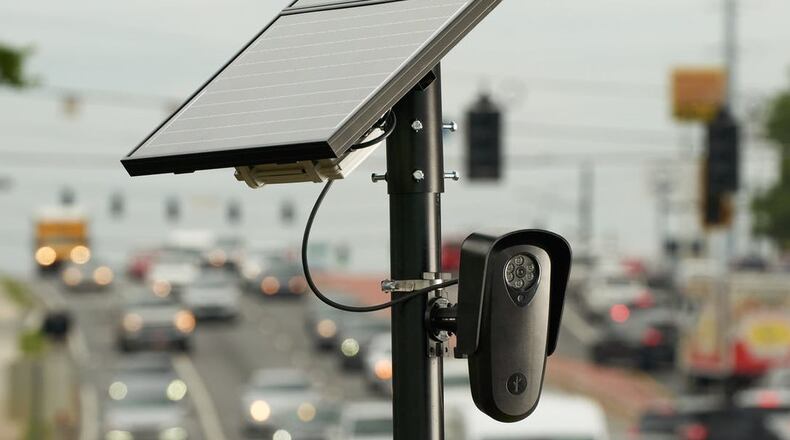Middletown, West Chester, Fairfield, Fairfield Twp., Mason and Springboro are some of the area police departments that have installed Flock Safety cameras, according to the presentation. More than 3,000 cities nationwide use the Flock Safety cameras.
The stationary license plate readers are gaining in popularity because they “help find a solution to crime” at a time when police departments have limited resources and police need to regain citizens’ trust, said Vaughn Roland from Flock Safety, the Atlanta-based maker of license plate readers.
Buchanan gave examples of where Flock cameras could have assisted his investigators.
He said in 2022 someone tried to break into the Gun Runner store on Main Street. Before the suspect could be located by Monroe police, he fled to his residence in Riverside, where he murdered his roommate, Buchanan said.
He eventually was captured in Kentucky and returned to Ohio, according to Buchanan.
Credit: Bill Lackey
Credit: Bill Lackey
If Monroe had Flock cameras, the police department could have identified the suspect’s vehicle quicker and possibly stopped the murder, the police chief said.
He said the cameras “solve crimes faster.”
Critics have said Flock Safety is building a nationwide surveillance system that lacks oversight.
Roland said the Flock cameras read license plates and make and models of vehicles, but are unable to perform facial recognition.
Flock Safety provides police departments with “indiscriminate evidence” from fixed locations, according to the presentation.
The cameras serve as a crime “deterrent,” Roland said.
The cameras are not tied to personally identifiable information, not used for traffic enforcement, and data is not stored beyond 30 days because it’s automatically deleted, Roland said.
He said gathered data is owned by the city and never will be shared by Flock.
Roland said the cameras and data they collect are valuable tools to assist officers with criminal investigation and have proven effective in solving or providing leads in numerous criminal and traffic-related investigations.
The automated license plate readers, or LPRs, are mounted to poles and capture a still image of a vehicle license plate number that goes to a cloud storage system. That information is then fed into a database, which is connected to the National Crime Information Center, a database law enforcement uses when entering stolen vehicles and missing/wanted persons.
The LPRs can send real-time alerts if the plate number belongs to a stolen vehicle or one being sought by law enforcement because of an AMBER alert or other missing person alert, officials have said.
Buchanan said the department is prepared to sign a contract with Flock Safety. He said the 23 cameras would cost $80,950 for installation and annual fees the first year and $69,000 the second year, or about $3,000 per camera.
The police department would fund the first year with its drug fund, then budget the cost every year, Buchanan said.
The contract would be year-to-year, and the city could cancel the contract after each year. Flock Safety owns the cameras and is responsible for any maintenance issues.
The possibility of the city obtaining Flock Safety cameras will be discussed April 23 during the next Public Safety meeting, city officials said. Legislation is expected to be on that night’s City Council agenda, Buchanan said.
About the Author

